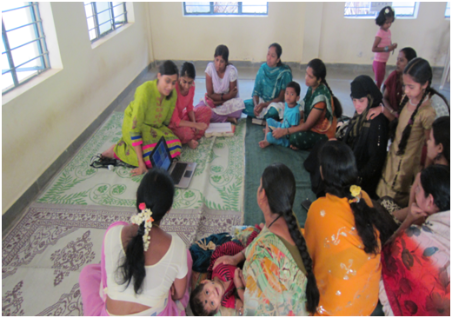Society for Community Health Awareness Research and Action
Lessons Learned in SOCHARA
By Madhavi Venugopal, Former CHLP Fexi Fellow, 201

I joined SOCHARA as a flexi-fellow during my gap year before joining the University of Chicago. Before my SOCHARA experience, I volunteered at low-income neighborhoods so I understood some social determinants of health and knew there were alternative medical forms thanks to frequent trips to India to visit my grandparents. I was a novice in all aspects of holistic healthcare and was eager for the opportunity to learn as much as possible. I also had a romanticized view that I would waltz into a community and would magically solve any health concerns. After one year in the program, I learned more than I could have expected from my mentors, peers, and from those I interacted with in the community. The three most important lessons I learned during my time at SOCHARA were (1) the community should trust the worker enough to divulge personal details(2) communities are made up of individuals with various skill sets and (3) anyone is capable of learning.
I walked into SOCHARA thinking I was fully capable of going to the community and solving an issue. Little did I know that most of the struggle is not planning a solution, but rather the implementation. Mr. Sam Joseph conducted a session on community mapping and the next day, our assignment was to go to an urban slum and draw a map with the help of individuals living in that community. We also had to find out what the community members saw as pressing problems (alcoholism, domestic violence, etc.). The lesson sounded simple and I was confident that my group could easily complete the assignment. I will never forget how difficult it was to first, earn the women’s trust to assist us in mapping their neighborhood and second, convincing them that our only purpose was to learn about their lives. The ladies would repeatedly ask me why I needed to know the information and if I was going to tell the police or government something. I remember coming back to my grandmother’s house and saying, “If just finding out issues is this difficult, I cannot imagine an actual project.” It was then I learned my first lesson.
I spent my first field experience at the Association of People with Disability (APD) and interacted closely with students with a wide array of disabilities (deaf, cerebral palsy, autism, etc.). I worked closely with a community physiotherapist and a speech therapist and learned from their frequent meetings with the student’s parents that there was more than one timeline for improvement. After spending a lot of time with a few students, I understood there was more than one way to explain something so they would understand and the students would help me understand their thoughts through various props. They would sometimes get frustrated that I could not understand what they were saying and would point at various pictures in the book and at various objects in the room until I could understand them. I was surprised and happy to learn that some students were much better at explaining concepts than I was without speaking. Although the world categorized them as handicapped or disabled, they had traits surpassing that of other “able-bodied” individuals. , It was then I learned my second lesson. The students, therapists, volunteers and teachers all had different skill sets and all skills were valuable and necessary for APD to function in an efficient manner.
In my second field placement, I worked with Anusha, another flexi-fellow to observe women self-help groups and make home remedy booklets in English, Kannada, and Tamil through Headstreams. After Mr. Naveen Thomas briefed us on financial literacy, we went with two other Headstream workers to observe how the meetings were conducted. In the first meeting, the two workers did most of the talking but as the weeks flew by, the women spent more and more time talking. They were conscientious about the common pool of money and were excellent treasurers and confidants to the other women in the group. They were not the best educated. In fact, a majority of the women did not complete their 10th standard but still were able to maintain a community insurance pool of money while taking care of their children, cooking, and living in poverty and other harsh conditions. I remember having immense respect for these women because not only were they accepting of me, but they were interested in learning. When one of the workers, Sheila, ran a workshop on finances and membership, most of the women paid attention and only left when their children needed them. In SOCHARA, I was the youngest and least experienced. There were individuals with bachelors, doctorates, and MPHs and I there I was, just finished with my 12th.The fact that even I was able to learn about community health says a great deal about the caliber of SOCHARA and how anyone can learn as long as they show interested. It was then I learned my third lesson.
I am grateful for the SOCHARA lessons I attended and the field placements in which I participated because not only did I learn material about the Indian healthcare system and community health, but learned how to apply the material I learned in a community or observe others applying the material. The three lessons I learned are not just applicable to community health so attending SOCHARA has made me a more rounded person. I returned to the United States inspired and excited to pursue a career in health and thank SOCHARA for the fond memories. Everyone is amazed at the experiences and lessons I have had the pleasure of taking during 2013-2014.
